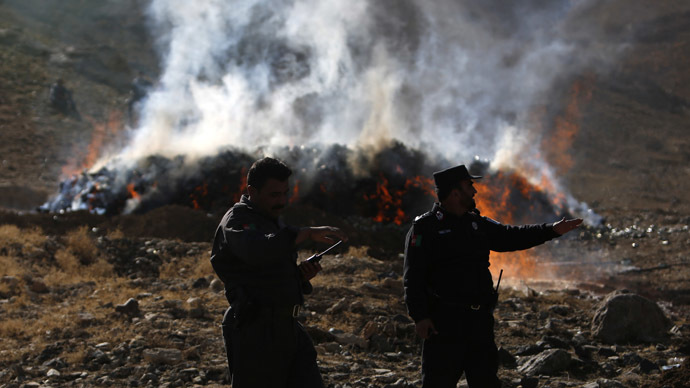‘Drug trafficking may become Jihad financial lifeline after Afghan withdrawal’

The war on drugs in Afghanistan is unlikely to be successful as the international forces withdraw local players lack a mechanism to address the problem of narcotics, Khuram Iqbal - Co-author of Pakistan Terrorism Ground Zero, told RT.
RT:A newreport has found the war on drugs in Afghanistan remains colossally expensive, largely ineffective, and likely to get worse. Do you agree?
Khuram Iqbal: If your question is related to the drug production in Afghanistan, its impacts on Pakistan, I would say that the impact of poppy cultivation in Afghanistan is [significant] in Pakistan. According to some estimates by the United Nations, Pakistan remains a transit as well as a destination country for far more than 30 per cent of the opium produced in Afghanistan. On the one hand, it has resulted in widespread drug abuse in Pakistani society, and on the other hand, it has created a very complicated and dangerous nexus between drug cartels and terrorist organizations which are operating from the Pakistan-Afghanistan border region. What we are witnessing in this region is that the groups of Pakistani Taliban are cooperating with drug cartels which are operating with them from Afghanistan to seek finance, and to protect their finances. Drug cartels and criminal syndicates are basically relying on terrorist organizations to ensure the security of their production facilities and their transit routes. And one alarming trend which has recently emerged in the Pakistan-Afghanistan border region with regards to the drug cultivation is that there is a number of terrorist organizations which have sought a religious decree from their handpicked Islamic scholars which justify the production and trafficking of drugs to wage Jihad. So we can conclude that the problem of narcotics in Afghanistan is not only facilitating the organized criminality but it is also contributing to transnational terrorism.
RT:The US are withdrawing from Afghanistan leaving record high levels of drug trafficking there. This is just one of the consequences of the devastating war in the country. What legacy as a whole the Americans are leaving?
KI: The international forces are preparing to withdraw from Afghanistan. Once they withdraw all the fragile gains which have been made against the narcotics trade in Afghanistan are likely to dissolve. I am afraid that after the withdrawal of international forces from Afghanistan the narcotics trade in the country can potentially emerge as the financial lifeline of the global Jihad movement. So a war on drugs in Afghanistan is highly unlikely because firstly, the international forces are withdrawing from the region and, secondly, the regional players, the countries in the Southern and Central Asian region lack coordination, they lack a mechanism which can address the problem of narcotics in Afghanistan.
RT:Is the Afghan government capable of handling the situation on their own?
KI: I suspect not, because there have been a number of instances where high-profile Afghan officials have been found involved in poppy cultivation, they have been found involved in drug trafficking. One prominent example of such cases is the late brother of the former President Hamid Karzai who was involved in drug trafficking on a massive level. As soon as the international checking balance goes down in the coming year or so we will see more corrupt Afghan officials, we will see more Afghan tribal elite resorting to drug trafficking to meet their financial needs and run their fractional infighting.
The statements, views and opinions expressed in this column are solely those of the author and do not necessarily represent those of RT.
The statements, views and opinions expressed in this column are solely those of the author and do not necessarily represent those of RT.












